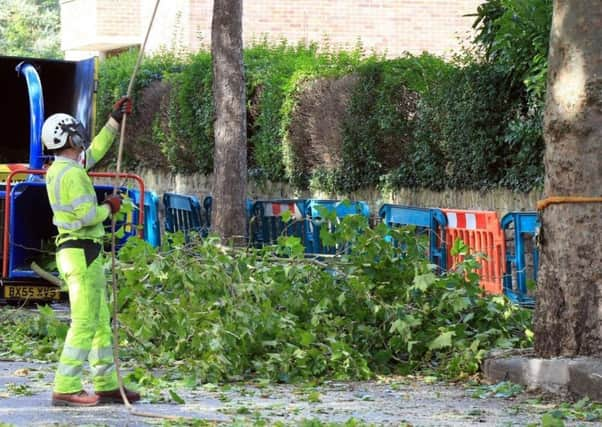Sheffield Council unable to explain financial impact of changing 17,500 tree replacement target


It was revealed in March that the council’s £2.2bn highways maintenance contract with private firm Amey stipulates that trees are removed “at a rate of not less than 200 per year so that 17,500 are replaced by the end of the term”.
The 25-year contract, which started in 2012, also involves upgrades and repairs to the city’s roads, pavements and street lights.
Advertisement
Hide AdAdvertisement
Hide AdThe council has said the previously-undisclosed figure is a form of “financial cover” should there be an outbreak of disease that requires that many to be removed, with the true number to be replaced with saplings over the course of the contract more likely to be around 10,000.
It said in March: “If, at the end of the contract, a smaller number [than 17,500] has been replaced, a financial adjustment will be made.”
But the council said it was unable to say whether it or Amey would benefit financially from the contract adjustment, on the grounds that it is not possible to say how it will work “as Amey aren’t paid to replace individual trees”.
Paul Billington, the council’s director of environment, was challenged about the 17,500 figure - which represents almost half of the city’s 36,000 street trees - in a court case against four anti-tree felling protesters this week. Mr Billington told the hearing, in which the council was seeking to have the four campaigners sent to prison, that the figure did not relate to a “target” and was used in order to give bidders for the contract the opportunity to “consistently price things”.
Advertisement
Hide AdAdvertisement
Hide Ad“What it means is, the council, if needed, could request 17,500 to be removed or felled without it costing the council any more,” he said.
Barrister Paul Powlesland, representing two of the campaigners, asked: “If the council does not have a target of 17,500, then is it fair to the taxpayers of Sheffield that they have paid for 17,500 to be removed?”
Mr Billington responded: “It might be in their interest to fell less than that number, but as I’ve said, we won’t know what the final number is until the end of the contract.”
When asked by The Yorkshire Post to clarify whether Mr Billington’s remarks meant the council is paying for 17,500 trees to be replaced as part of the contract agreement, the authority referred back to its March statement and said it remained the case it was still unable to say how the “financial adjustment” would work in practice.
Advertisement
Hide AdAdvertisement
Hide AdIn April, the council refused a Freedom of Information request asking for clarification on whether the financial adjustment will be made in the authority’s or Amey’s favour by saying it did not “hold any recorded information” about this issue.
The response stated: “The Freedom of Information Act applies to information that is recorded and does not place an obligation on us to provide a requestor with an opinion on something where we do not have that recorded.”
Three of the protesters in the court case were found to have breached an injunction banning them from going inside ‘safety zones’ around trees due to be felled, with a case against the fourth person yet to be determined.
Two received suspended prison sentences and no further action was taken against the other but all three are expected to face legal bills running into thousands of pounds when costs are determined.
Advertisement
Hide AdAdvertisement
Hide AdThe ongoing situation has led environmental charity The Woodland Trust to describe the council’s handling of the saga as “an example of the wrong way to manage trees and the wrong way to manage disputes” in a letter to the Sunday Times today.
Councillor Lewis Dagnall, the recently-appointed cabinet member for environment responsible for overseeing the tree-felling strategy, wrote in the same newspaper: “We understand the passion people have for our urban trees and there has been much debate about the best way forward when it comes to tree replacement.
“In recent weeks I have met residents and stakeholders to listen to how we can find a compromise. I am optimistic that Sheffield can come together and harness the enthusiasm for street trees.”